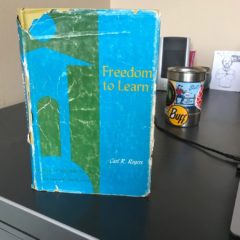With Apologies to Carl Rogers and His Work
 Carl Rogers was a significant psychologist and teacher. He was 85 when he died in 1987. The humanistic approach he’s known for gets applied across a variety of fields including therapy and politics. In education the approach is the basis of a process often called “learner-centered” teaching. Rogers describes its basics in five hypotheses that start with, “A person cannot teach another person directly; a person can only facilitate another’s learning.” He wrote a bunch of books including Freedom to Learn: A View of What Education Might Become, which spends 300 or so pages discussing learner-centered teaching. I have two hardcover copies of the 1969 edition. I revere what they say to a probably unwise degree. I also cherish them as objects, partially because they smell exactly as books of their vintage ought to smell. They also contain a version of the short essay “Personal Thoughts on Teaching and Learning,” which has been published in various forms in a lot of venues since the 1950s.
Carl Rogers was a significant psychologist and teacher. He was 85 when he died in 1987. The humanistic approach he’s known for gets applied across a variety of fields including therapy and politics. In education the approach is the basis of a process often called “learner-centered” teaching. Rogers describes its basics in five hypotheses that start with, “A person cannot teach another person directly; a person can only facilitate another’s learning.” He wrote a bunch of books including Freedom to Learn: A View of What Education Might Become, which spends 300 or so pages discussing learner-centered teaching. I have two hardcover copies of the 1969 edition. I revere what they say to a probably unwise degree. I also cherish them as objects, partially because they smell exactly as books of their vintage ought to smell. They also contain a version of the short essay “Personal Thoughts on Teaching and Learning,” which has been published in various forms in a lot of venues since the 1950s.
I first read the essay when Principal Heskins, who helped radicalize my approach to teaching, emailed me a copy in the early 2000s. Since then it has never been far from my thoughts, even when my conscious brain forgets about it for a year or two. I re-read it for probably the 20th time a couple days ago. It got me feeling as angry and excited and lonesome and hopeful as it always does. Instead of wandering around the campus where I work telling everyone they should read it, be as moved by it as I am, and identify with it as deeply as I do, I decided to write this essay of my own.
If I believed in having heroes Rogers would be one of my education heroes along with bell hooks, Alfie Kohn, Vine Deloria Jr., and Paulo Freire, whose work helps me avoid a despondency I tend toward. What they say and how they say it helps me find hope and courage in a dominant academic culture that can quickly convince me that my “non-traditional” ideas about teaching, learning, and knowledge aren’t worth taking seriously. It’s a culture designed to punish ideas that challenge preeminent norms about what knowledge is and who owns it.
I’m a nobody in that culture. A sad-sack, low-in-the-hierarchy writing instructor. Technically I’m an assistant professor, although that label is pretty much the only thing that’s changed, in terms of my institutional-cultural status, since I finished my doctorate a little while back. (It is, after all, just an Ed.D., and it’s only in teaching and learning, and we all know that scholarship of teaching and learning is less important than intellectual inquiry in most other areas.) I still share the same office (although with just one colleague instead of five, which is cool). Still have the same wages I’m grateful for and self-conscious about — I’m still convinced I only make as much as I make because it’s all I’m worth. Same annual academic-year contracts that after 20 years or so leave me feeling like I’ve never been a real member of any faculty; leave me feeling like I’m in a relationship with an entity that’s far less into me than I am into them; leave me feeling like I’m in the kind of lopsided relationship where if I worked up enough courage and confidence to say, “I’m leaving you because I’m tired of you taking advantage of me,” the entity would smile in a head-patting way they probably think is gracious and say something like, “I’m sorry if that’s how you feel. I’m sad to see you go, but it sounds like maybe you have some work to do on yourself. Be well.” (If the exchange were in an email their smug sign-off would be “Best” or “All best.”) Same unintentionally patronizing support from well-meaning tenured and tenure-track folks who really do seem to see staff members and non-tenure-line teachers as legitimate colleagues, and who also seem sincerely troubled about being protected by a system that in some ways intentionally exploits and envulnerates people they care about. Same unmistakable dismissiveness from some tenure-line folks whose thin sheen of politeness can’t hide their sense of entitlement to inordinate protection at others’ expense, or their sincere belief that folks at their rank really are just a lot more important and much smarter than everyone else.
All of which is to say I am no Carl Rogers. I and my sad little “career” are insignificant even at the school where I work. I don’t really even publish, bro. But I do have some credible things to say about teaching. And despite feeling deeply unsure about many aspects of my own work and worth and perception, I trust the legitimacy of my perspectives in these matters. I’m going to talk about some of those perspectives a little further down by imitating what Rogers says and how he says it in “Personal Thoughts on Teaching and Learning.”
I’m scared to do any of this. It’s probably unwise. By the early 1950s, when Rogers was approaching 45 and had established himself as a big deal and a valuable presence, not a lot bad could happen to him, in terms of employment and credibility, if he provocatively expressed ideas that would boldly challenge accepted perspectives in his field. At 48, I have none of the institutional or career security he had. I’ve earned a small bit of respect among a small group of colleagues and friends. I’m grateful for that. But in terms of freedom to really let my pedagogical–epistemological freak flag fly, I have zero standing or clout. I’d still rather say this stuff out loud than cram it down and let it fester with everything else already in there. That preference is possibly self-destructive. It’s also not surprising to me when I think about the combination of my huge ego, the adolescent chip on my shoulder, my inability to understand the world in the way successful people understand it, my moderate facility with words, and this platform for publicly saying stuff.
 In comments preceding the version of “Thoughts on Teaching and Learning” published in the 1969 edition of Freedom to Learn, Rogers says he first presented the ideas in what became the essay at a Harvard conference on “Classroom Approaches to Influencing Behavior.” He says his audience was “made up of forward-looking college teachers, many of whom were using discussion methods in their classes.” (Harvard is a mid-sized private university in Cambridge, Mass.) He also says, “I was foolish enough to expect an understanding and acceptant audience. The response was instead furiously critical for the most part, with only a few soft-spoken individuals speaking up, with gradually increasing force, to indicate that their experience had led them to somewhat similar conclusions, which they had never dared to voice.”
In comments preceding the version of “Thoughts on Teaching and Learning” published in the 1969 edition of Freedom to Learn, Rogers says he first presented the ideas in what became the essay at a Harvard conference on “Classroom Approaches to Influencing Behavior.” He says his audience was “made up of forward-looking college teachers, many of whom were using discussion methods in their classes.” (Harvard is a mid-sized private university in Cambridge, Mass.) He also says, “I was foolish enough to expect an understanding and acceptant audience. The response was instead furiously critical for the most part, with only a few soft-spoken individuals speaking up, with gradually increasing force, to indicate that their experience had led them to somewhat similar conclusions, which they had never dared to voice.”
Carl. Bruh. I feel that. I’ve got stories.
Rogers says the essay is, “A distillation of the convictions which I have drawn from my experience as a teacher and it has, in the past, been successful in provoking thought.” He says, “I wrote this paper as a concise statement of my own views, in order to stimulate discussion.”
If I haven’t yet motivated you to read a copy of the essay, I don’t know what else to do. Two lines down is where I start wholesale imitating Rogers and occasionally just quoting him directly.
I want to say a few things about teaching required college writing courses. Experience tells me these things can apply to teaching in many other academic fields. I hope what I say will provoke responses from you and conversation among us all. Everything I will say is sincere. I am not provoking only for the sake of provocation. I am trying to express deep convictions I have earned throughout decades as a teacher, as a student, and as an inquisitive, restless, most often baffled and frustrated human being. “Trying to express” is the operative term. Much of what I say will inadequately articulate what I think and believe. Much of what I will try to express is an inadequate representation of thoughts and beliefs that are in various states of development. My words will imperfectly represent the jumbled current states of my knowledge and perception, which are constantly shifting and evolving, sometimes with clear progress and sometimes in ways that leave me feeling nothing but confused.
I think a lot. Too much. I also, in my own ways, “find it a very troubling thing to think, particularly when I think about my own experiences and try to extract from those experiences the meaning that seems genuinely inherent in them. At first, such thinking is very satisfying, because it seems to discover sense and pattern in a whole host of discrete events. But then it very often becomes dismaying, because I realize how ridiculous these thoughts, which have so much value to me, would seem to most people. My impression is that if I try to find the meaning of my own experience it leads me, nearly always, in directions regarded as absurd.”
Please don’t take any of what I’m about to say as “conclusions for someone else, or a guide to what others should do or be.” It’s where I think I am. It took me a while to get here. Some of it is where I’ve always (since junior high) been and expect to always be, and I’ve only recently started figuring out how to kind of describe it. Some of it is a lot different from where I used to be, and I’m sure some of it will change subtly or significantly in the future.
a) I may as well start with this fundamental idea: My experience tells me I cannot teach another person “how to write,” and trying to do that is, for me, arrogant and a waste of time.
b) I find helping a fellow human being build practical writing knowledge and skill to be a much different process — based on much different, more preferable, intentions and beliefs — from “teaching them how to write.”
c) My own process of intentionally building writing knowledge and skill over nearly 30 years tells me that almost anything one person can “teach to” a fellow human being in an academic writing course has very little, if anything, to do with actually learning how to write credibly, confidently, and autonomously in settings beyond that course.
d) I am 48 years old, and I have been trying to learn how to write since I was 19. My ongoing process tells me no single-semester or even multiple-semester writing course can do for students what most of us in academia tell each other it can or should do. Experience tells me that agreed-upon myths about what can happen in any writing course put counterproductive pressure on everyone involved in the process.
e) A lot of very cool, practical stuff can happen in a well-designed writing course designed to help human beings learn.
f) I prefer the term “learning-centered teaching” to “learner-centered teaching.” (Yes: all “teaching” should be learning-centered. A lot of it isn’t.)
g) I am not a bad writing teacher if students leave my classes without a set of knowledge and skills that comprises “knowing how to write.” (The same is true of teachers whose former students arrive in the same condition to the courses I teach.)
h) My writing and teaching experiences tell me that very few people who can write well, even in specific professional and academic forms, learned to do it through required writing courses.
i) Years of conversation among colleagues tells me that when we are being honest enough to make ourselves frighteningly vulnerable, many writing teachers will admit we feel forced to perpetuate a myth-based process that prepares students for nothing more than complying with that myth-based process, which bears very little resemblance to what, why, or how they will write in the rest of their lives.
j) I find the process of giving narrative feedback on writing much more effective, rigorous, and credible, in helping people build knowledge and skill, than even the most (ostensibly) objective quantitative grading process.
k) Treating a punishment-and-reward process as the whole point of any writing course is antithetical to helping fellow human beings build practical writing knowledge and skill. It is also usually the most efficient way to teach a semester load of three or four first-year-composition sections each filled with 25 human beings who are steeped in fear of writing because they have been conditioned to believe damaging myths about what writing is and what writing courses are for. Those folks’ distorted thinking about writing usually shows very clearly in their beliefs about why they’re being forced to take a required writing course, and in their beliefs about what their level of writing facility says about them as students and human beings.
l) Students who apparently or actually dislike writing and reading are neither deficient nor disappointing. They are not my adversaries. They do not need me to convert them into feeling the same ways I do about reading and writing, and I will not dehumanize them by trying to.
m) Students who find infinite subtle and overt ways to say, “Please just tell me what to do!” are not insufferable grade-grubbers. They are practical strategists who know the game, understand its consequences, see through teachers’ attempts to deny we’re asking them to play it, and have reached their current point of academic progress by playing it for many years. They are trying to survive in a situation they had nothing to do with establishing.
n) Assessment — systematically asking and clearly answering the questions, “What do I want to help people learn?” and “Are they learning those things?” and “What are you trying to help me learn?” and “Am I learning those things?” — is an inherent aspect of mindful teaching and learning in writing and all other disciplines. Trying to teach or learn without asking and answering those questions makes no sense. Teachers who arrogantly rail against it as an odious administrative distraction from their “real” work make no sense. Administrators who present it in tone-deaf ways that make it easy to perceive as an odious administrative distraction make no sense.
I have a lot more to say about all of that, but I’ll hold off for now. “I think I had better stop there. I do not want to become too fantastic. I want to know primarily whether anything in my inward thinking, as I have tried to describe it, speaks to anything in your experience of the classroom as you have lived it, and if so, what the meanings are that exist for you in your experience.”
Recommended Links:
Leave a Comment
Only registered members can post a comment , Login / Register Here














2 Comments
Avesa Rockwell
about 5 years agoChris Godsey
about 5 years ago